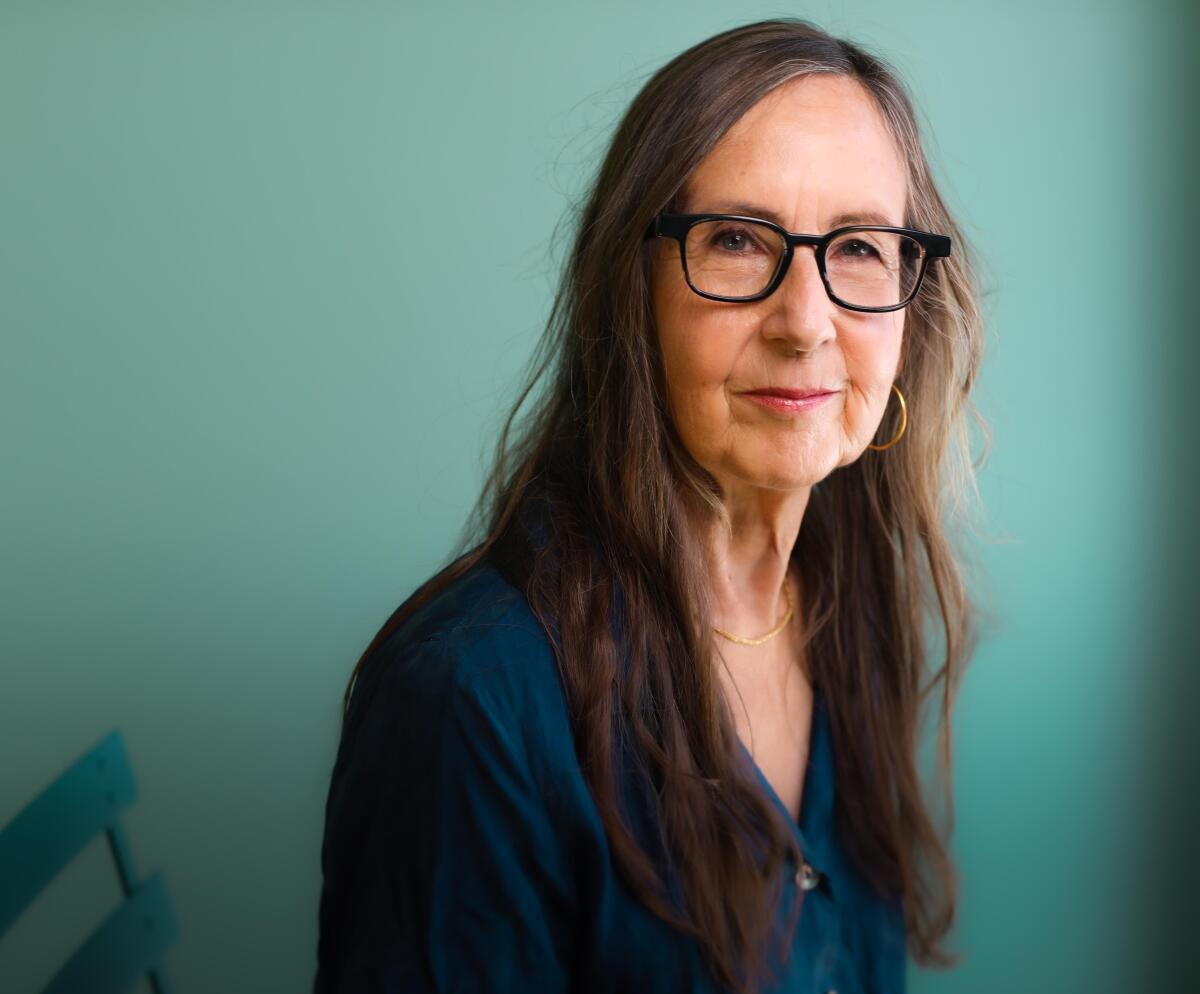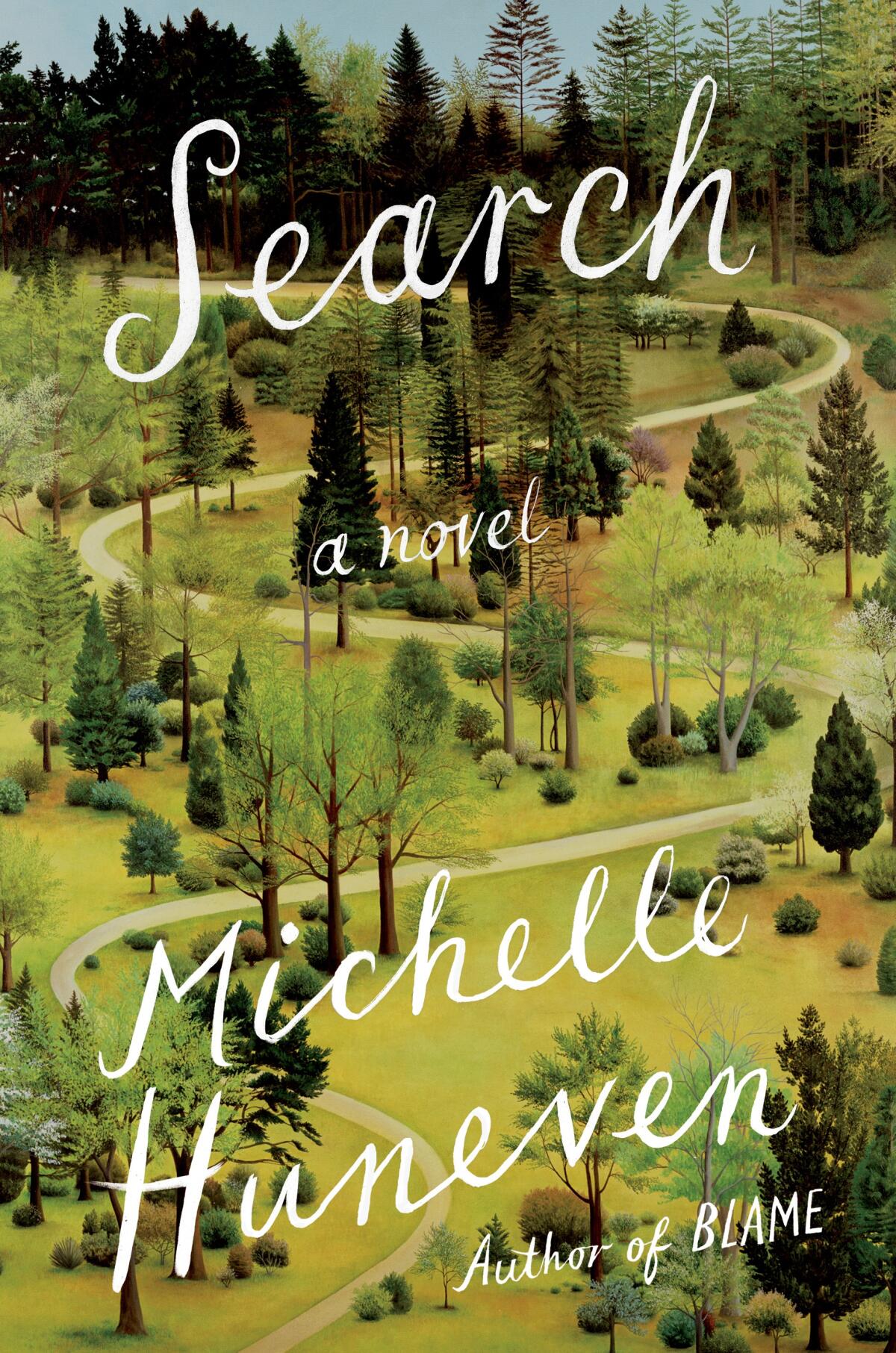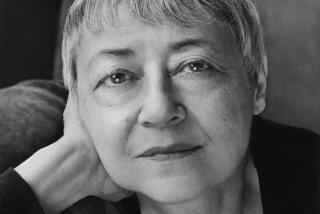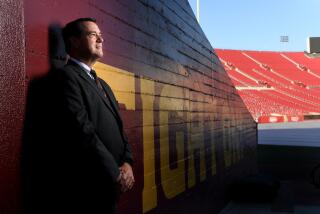Even the Unitarians are divided in Michelle Huneven’s new novel, ‘Search’

- Share via
On the Shelf
Search
By Michelle Huneven
Penguin Press: 400 pages, $27
If you buy books linked on our site, The Times may earn a commission from Bookshop.org, whose fees support independent bookstores.
Dana Potowski, the narrator of Michelle Huneven’s sassy and savvy new novel, “Search,” is a food writer and restaurant reviewer with a taste for international delicacies and a high critical bar. Life is too short for soggy dim sum and overcooked salmon.
Years ago, adrift and discouraged by the lack of freelance prospects, Dana enrolled in a Protestant seminary, only to drop out after two years. She relished learning about religious traditions and sorting through classic theological dilemmas, but eventually the course palled. She reluctantly came to view Christianity as “a melting ice floe that the very best minds had abandoned.”
So far so typical of Huneven’s novels, all set in Southern California, which chronicle middle-class professionals forced to deal with crises of authenticity and integrity. The burdens of alcoholism, for instance, haunt her debut, “Round Rock,” as well as “Blame,” her most lauded book, a finalist for both a Times Book Prize and a National Book Critics Circle Award.
“Search” — an apropos title on several levels — tracks a surprisingly amusing account of ecclesiastical politics in the age of “wokeness” and, to a lesser extent, Dana’s own pursuit of spiritual and personal fulfillment.
As the novel opens, she has returned to the Unitarian Universalism bequeathed by her parents. The Arroyo Unitarian Universalist Community Church in the San Gabriel foothills is “famous for its preaching, social activism, and its enchanting if derelict three-acre gardens.” Its congregants are a motley collection of upper-middle-class liberals, aging hippies, socially conscious millennials, lawyers and teachers.
When the current minister, Tom Fox, announces his retirement, a search committee, including Dana, is formed to choose his successor. How to decide who’s best to lead the congregation?
Michelle Huneven on Christmas past and present
Leave aside the worst-case scenarios — a scoundrel in the mold of the fictional Elmer Gantry or the real-life Jim Bakker — the pulpit is filled with perils for even the best-intentioned. Ideally, ministers must be inspiring speakers, wise counselors, able fundraisers and administrators. They must navigate among clashing congregational factions. They must boost the membership and repair the leaky roof.
The task of choosing a new minister can be equally treacherous because, as Dana observes, “a church is a human structure. We build it and inhabit it, and immediately stories and secrets abound within.”

On the eight-person committee, Dana forms a bloc with Charlotte Beck, an attorney and the congregation’s ex-president, and Belinda Bauer, an 83-year-old retired high school principal. They firmly believe that what the church needs most, as determined by a membership survey, is a newcomer with strong preaching and administrative skills. Only leadership of this sort will secure the future of the institution.
Ranged against them are the youngsters, who preach a gospel of change and diversity. No more white male leaders, they demand. Their headstrong leader is Jennie Kanematsu-Ross, a tattooed mother of toddlers who grew up in the church. Allied with her are Riley Kincaid, a young scientist who directs the church handbell choir (and a secret polyamorist), and Curtis Acevedo, a gay Filipino American.
Stuck in the middle, Adrian Jones, a Black psychotherapist, plays the role of soothing peacemaker, while the aged Sam Rourke-Jolley, whose wife is the church’s biggest donor, numbly goes along to get along.
At the onset, members are reminded that their task is “a sacred process,” akin to a spiritual journey. As Dana learns, though, it’s more like a food fight. In fact, their meetings do involve Riley’s inventive cocktails and delicious food.
(At book’s end, Huneven, a James Beard Award-winning food writer, serves up some of the recipes the group has enjoyed. It’s as mouthwatering an experience as reading Martin Walker’s Bruno, Chief of Police mysteries, in which Bruno whips up French classics in the Dordogne.)
A sympathetic, well-wrought story of a brilliant young woman’s slow crawl toward self-understanding after her life is upended by a horrible accident.
After much give-and-take, some friendly and some contentious, the committee narrows the field to four finalists, then two. Elsa Neddicke is a onetime foreign correspondent known for her quiet wisdom and eloquent preaching. Alanna Kapoor, a beautiful twentysomething former actor not long out of seminary, prefers dramatic worship services over “Protestant austerity.” Her presentation of self, in lavender tunic and dark leggings, is a study in flamboyance: “Among us drab mortals,” Dana notes, “she shone like a mythic creature, a mermaid or Hera herself.”
You can guess which side wants which candidate.
Dana, who laments that identity politics often trumps good sense, clearly seems a stand-in the author. Taking into account ethnicity, age, sexual orientation and so on may be important in decision-making of this sort, but it should not be an obstacle to proven leadership.
By contrast, Jennie, the troublemaker, sees the world only via those rigid guidelines. Of one candidate, she blurts out — in an example of Huneven’s spot-on dialogue — “I’m not impressed by some wussy bread baker … who wears black dress socks with his Birkenstocks.”
Dana’s own observations are spiced with wit. Trying to explain the difference between Unitarians and Universalists, who did not merge until 1961, Dana jests: “Suffice it to say that Ralph Waldo Emerson was a Unitarian and P.T. Barnum a Universalist.”
Dana’s seminary sojourn was always more about deepening her spiritual life than finding a vocation. But now, if the committee’s decision deprives her of a church that inspires and nourishes her, does that mean her own search is doomed to continue? She isn’t finding what she needs at home; Dana and her Jewish husband seem to live parallel lives. He’s buried in his legal practice, she in her journalism. He attends synagogue, she a church. As Dana fantasizes about Adrian, the psychotherapist, Huneven suggests the marriage may be in trouble, but it’s only a tease, never pursued.
A guide to the literary geography of Los Angeles: A comprehensive bookstore map, writers’ meetups, place histories, an author survey, essays and more.
If this choice seems only mildly unsatisfying, allowing Acevedo into this colorful lineup is an outright mistake. Yes, Curtis is on the committee to check several inclusiveness boxes, but he’s only recently arrived at the church and hasn’t yet become a member. No church would ever grant a newcomer this crucial responsibility.
Nevertheless, “Search” is on balance a novel whose humor works because it is so plausible. Though thick with satirical moments, it is not quite a satire, since Huneven has too much respect for all her seekers. She stops just short of reducing them to stereotypes and regards their search as earnest, despite all the bruised egos, dead ends and outright silliness. Even the fierce cadre of the young is observed with as much fondness as ridicule.
Huneven will appear at the Times Festival of Books on the panel “Fiction: Writing Food Into the Story” on Sunday at 2 p.m.
Cryer, a former book critic at Newsday, is author of “Being Alive and Having to Die: The Spiritual Odyssey of Forrest Church.”
More to Read
Sign up for our Book Club newsletter
Get the latest news, events and more from the Los Angeles Times Book Club, and help us get L.A. reading and talking.
You may occasionally receive promotional content from the Los Angeles Times.









